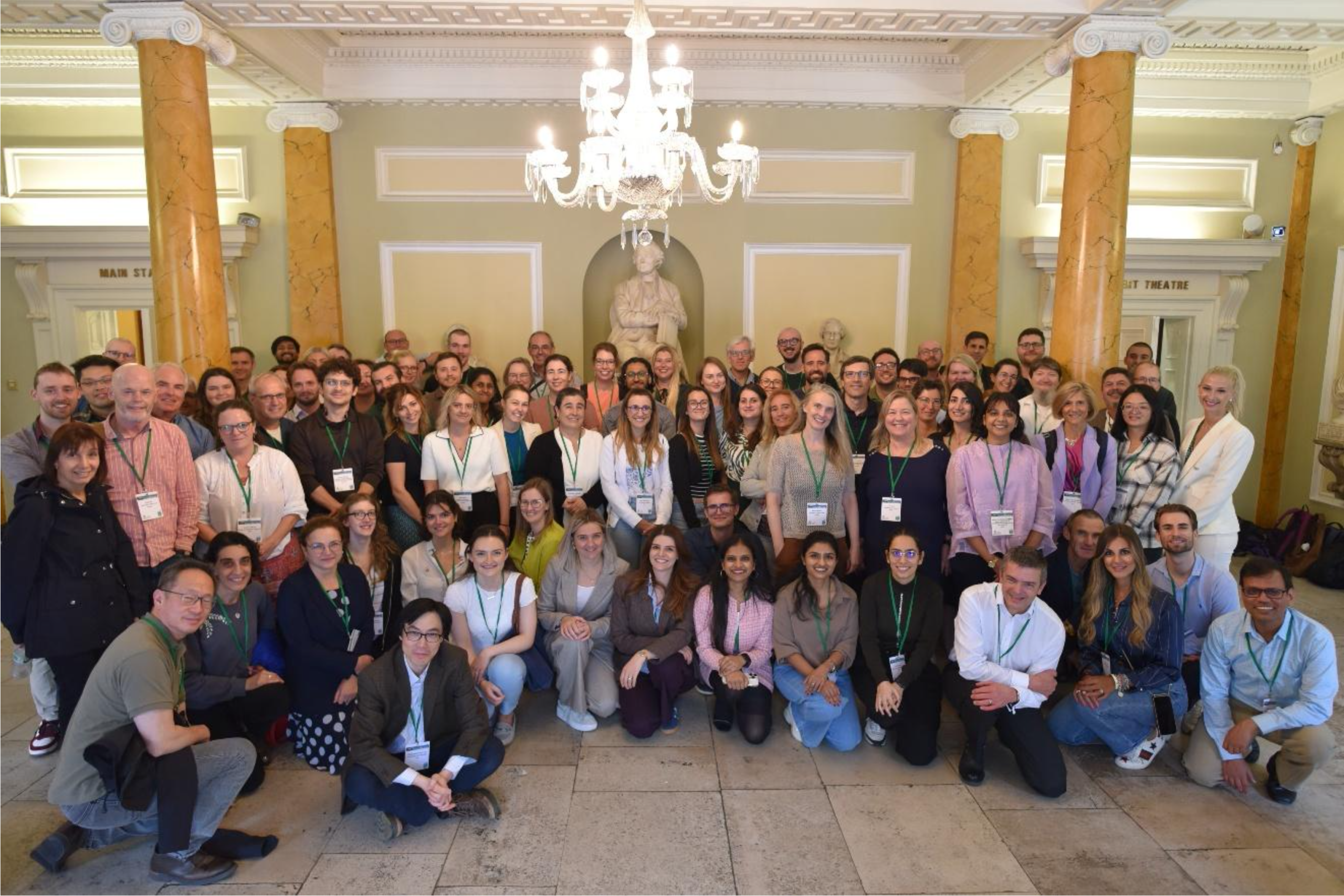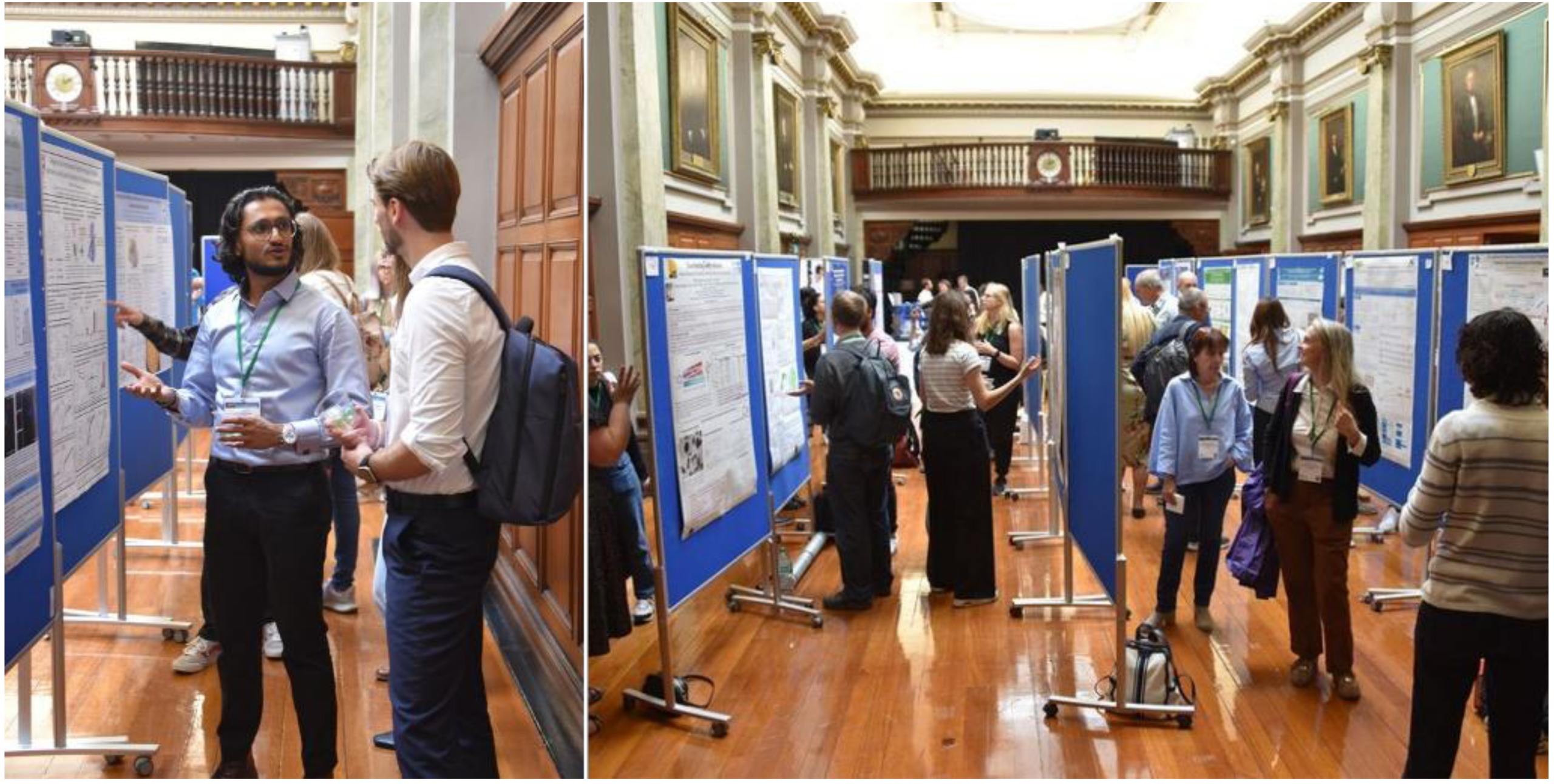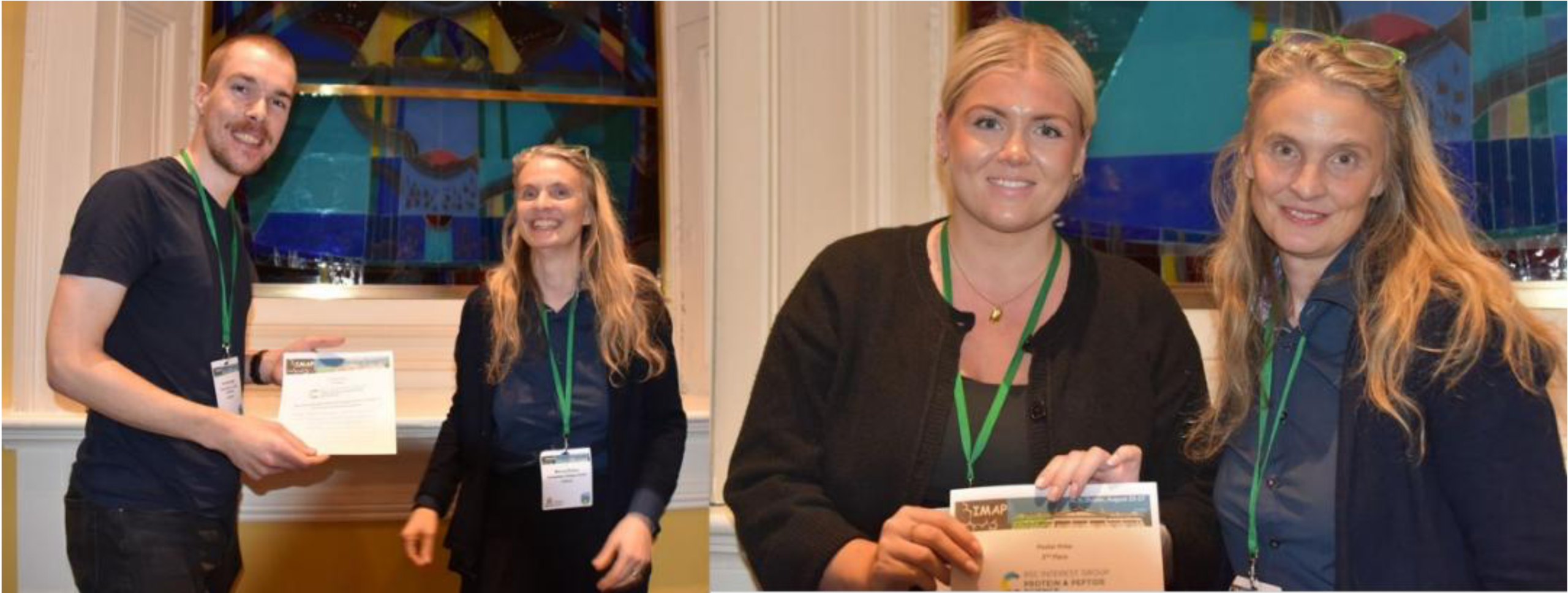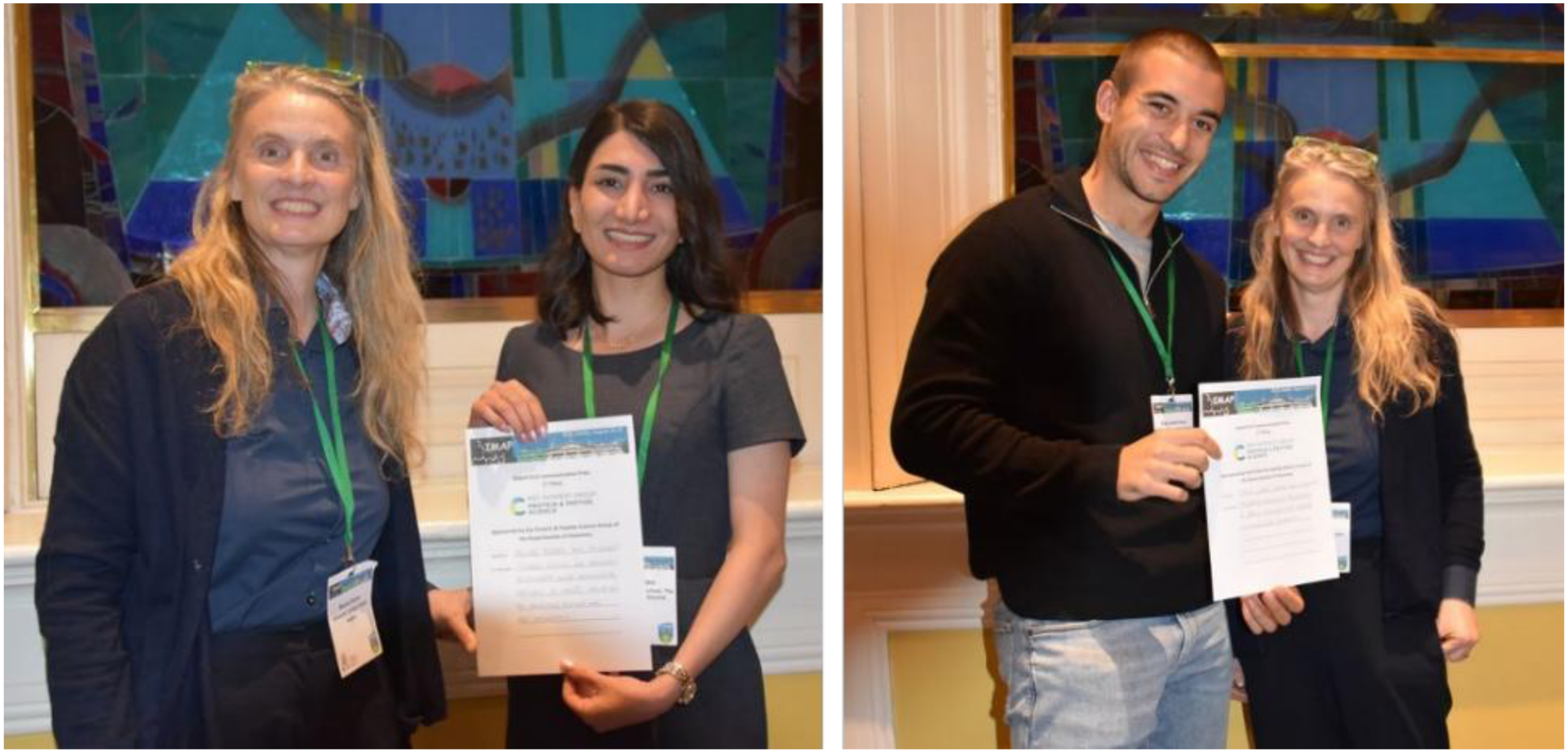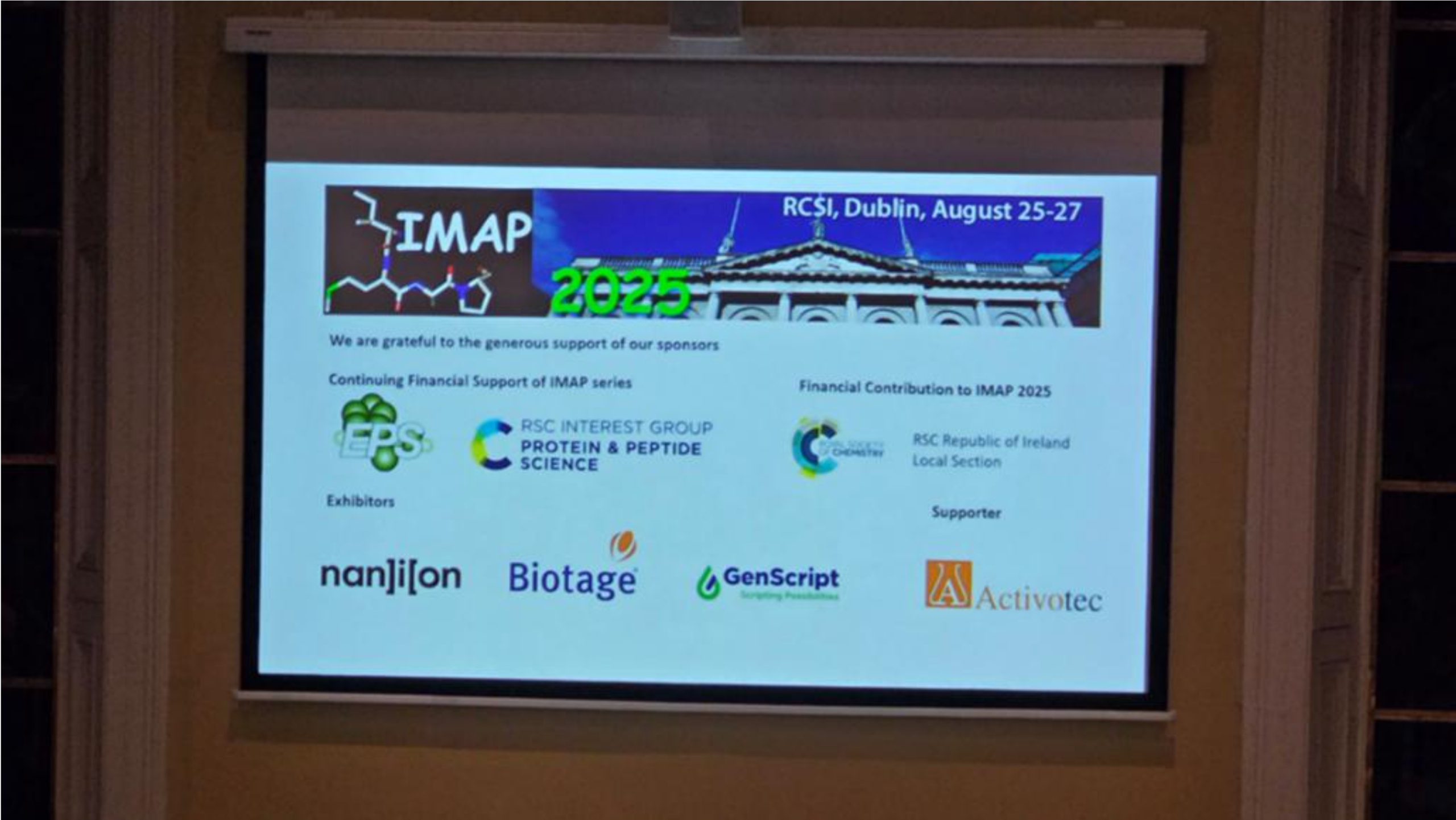The 12th International Meeting on Antimicrobial Peptides (IMAP 2025) took place in the Royal College of Surgeons (RCSI), located in the heart of the vibrant city center of Dublin from the 25th to the 27th of August 2025. (https://peptideconferences.org/imap2025/home). It attracted about 100 attendees from all over the world (photo 1).
The 2025 meeting covered a range of topics within the field of antimicrobial peptides (AMPs. The Organizing Committee consisted of Marc Devocelle, RCSI and Marina Rubini, UCD, (co-chairs); Edwin Veldhuizen (Utrecht University); Lidia Feliu (Universitat de Girona); Ralf Hoffmann (Leipzig University); Maria Luisa Mangoni (Sapienza University of Rome); Kai Hilpert (St. George’s University of London); Karl Lohner (university of Graz). As with previous IMAPs, it was agreed that such a meeting should promote the participation of PhD students and postdocs offering them plenty of space to present their skills and to divulge the results of their scientific work. This has stimulated intensive interaction among them and prompted the establishment of scientific collaborations as well as interpersonal relationships. Attendance of early-stage researchers was helped by the organisers being able to offer 13 travel bursaries, in part funded by the generous support of the EPS, to PhD students and postdocs who were presenting posters or talks.
Scientific and Social Programme
The scientific programme consisted of 6 sessions focusing on Mode of Action, Prediction and Design of AMPs; AMP structure and membrane interactions; AI / non‐AI supported database mining; AMP Resistance; Applications of AMPs in Therapeutics and Biomaterials; Lantibiotics and Non‐ribosomal Antimicrobial Peptides and 2 extensive poster sessions.
7 invited lectures were given by the following speakers in the beautiful Albert Lecture Theatre (Photo 2):
Prof Annelise Barron, Stanford University, who spoke about: “Antimicrobial peptoids: Emerging internationally as versatile, broad-spectrum, biostable, safe mimics of host defense peptides.”
Prof César de la Fuente, University of Pennsylvania, who spoke about “Accelerating antibiotic discovery using AI”.
Prof. Colin Hill, University College Cork, who spoke about “Manipulating the microbiome with lantibiotics”.
Prof. Fintan Kelleher, Technological University of Dublin, who spoke about “The lantibiotic nisin – can the tail wag the dog?”
Prof. Jean-Louis Reymond, University of Bern, who spoke about the “Chemical Space for Antimicrobial Peptide Design”
Prof. Anne van der Does, Leiden University Medical Center, who spoke about “Advanced Lung Cell Culture Models to Study the effects of AMPs on Infections, Host Defense and Tissue Repair”. Prof. Gerard Wong, UCLA, who spoke about ‘Beyond antimicrobial activity: How AMP like peptide motifs can mechanistically mediate inflammatory, cardiovascular, and rheumatic pathologies’.

Photo 2. Left: from left to right (top); Prof César de la Fuente, Prof. Colin Hill, Prof Annelise Barron; (bottom): Prof. Fintan Kelleher, Prof. Anne van der Does, Prof Jean-Louis Reymond, Prof. Gerard Wong. Right: view of the Lecture Room. During the meeting, the EPS Mobility Fellowship Programme was advertised to the audience.
Further, the Scientific Board selected 16 speakers for oral presentations and 14 speakers for rapid oral presentations from the pool of the submitted abstracts and 31 poster presentations altogether. At the end of day 1 there was also a Careers Workshop where Prof Anne van der Does, Prof Marina Rubini, Dr. Johanna Mbianda and Ms Freyja O’Duffy shared with PhD and postdocs their experience on different career pathways and engaged in an open discussion with the participants.
The poster sessions took place on the 1st and 2nd day of the meeting in an enjoyable and relaxed atmosphere (Photo 3).
Two juries selected the two best posters and the two best rapid communications for early carrier researchers. The prizes were presented at the end of the conference by Prof. Marina Rubini, representing the Protein & Peptide Science Group of the Royal Society of Chemistry (sponsor of the poster and short oral competitions).
The winners of the Poster Competition were (Photo 4):
• 1st place Renke Itzenga, University of Leipzig for his poster “Analysis of Peptides based on the Proline-rich Antimicrobial Peptides Api137 and Onc112”.
• 2nd place Libbi Moon, Durham University for her poster “Structure-Activity Relationship Insights of Antimicrobial Peptoid Library”.
The winners of the Best Short Oral Communication were (Photo 5):
• 1st place Negar Yazdani, University of Melbourne, for her paper “Protease Activity and Anaerobic Environment Alter Antimicrobial Efficacy of SNAPPs: Implications for Targeting Biofilms and Peri-Implantitis’.
• 2nd place Sergi Llanet Ferrer, Universitat de Girona for her paper “Membrane interaction mechanisms of BP100, 1036, and FV7 explored via molecular dynamics”.
The social events of IMAP included 5 coffee-breaks, 1 welcome reception, 1 social dinner and 3 lunches, all held in the beautiful premises of RCSI.
EPS sponsorship was acknowledged by the organizers during the meeting and the logo of the Society was displayed on the electronic materials of the conference (Programme & Abstracts Volume) as well as on the website of the IMAP meeting. We would like to thank the EPS and all other sponsors for their generous support (Photo 6)!
IMAP 2026 will take place in Split, Croatia in early September 2026 (the final date is yet to be fixed).
Contributed by Marina Rubini and Marc Devocelle

